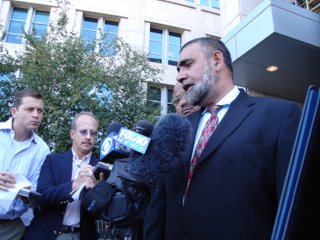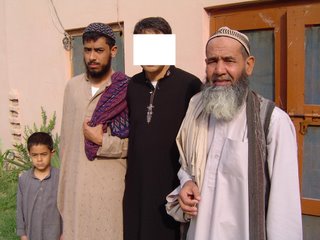Shameless Plagiarism
First read this SF Chronicle report from August 26.
http://www.sfgate.com/cgi-bin/article.cgi?file=/c/a/2006/08/26/MNGQ5KPVV91.DTL
2 Lodi residents refused entry back into U.S.
The federal government has barred two relatives of a Lodi man convicted of supporting terrorists from returning to the country after a lengthy stay in Pakistan, placing the U.S. citizens in an extraordinary legal limbo.
Muhammad Ismail, a 45-year-old naturalized citizen born in Pakistan, and his 18-year-old son, Jaber Ismail, who was born in the United States, have not been charged with a crime. However, they are the uncle and cousin of Hamid Hayat, a 23-year-old Lodi cherry packer who was convicted in April of supporting terrorists by attending a Pakistani training camp.
Federal authorities said Friday that the men, both Lodi residents, would not be allowed back into the country unless they agreed to FBI interrogations in Pakistan. An attorney representing the family said agents have asked whether the younger Ismail trained in terrorist camps in Pakistan.
The men and three relatives had been in Pakistan for more than four years and tried to return to the United States on April 21 as a federal jury in Sacramento deliberated Hayat's fate. But they were pulled aside during a layover in Hong Kong and told there was a problem with their passports, said Julia Harumi Mass, their attorney.
The father and son were forced to pay for a flight back to Islamabad because they were on the government's "no-fly" list, Mass said. Muhammad Ismail's wife, teenage daughter and younger son, who were not on the list, continued on to the United States.
Neither Muhammad nor Jaber Ismail holds dual Pakistani citizenship, Mass said.
"We haven't heard about this happening -- U.S. citizens being refused the right to return from abroad without any charges or any basis," said Mass, a lawyer for the American Civil Liberties Union.
-------
Then read this Dawn, Pakistan story from August 28.
http://www.dawn.com/2006/08/28/top14.htm
Two barred from returning to US
By Abdus Sattar Ghazali
SAN FRANCISCO, Aug 27: The US government has barred two relatives of Hamid Hayat, a Pakistani-American convicted of supporting terrorists from returning to the country after a long stay in Pakistan.
Mohammad Ismail, a 45-year-old naturalised citizen born in Pakistan, and his 18-year-old son Jaber Ismail, who was born in the United States, have not been charged with any crime. However, they are the uncle and cousin of Hamid Hayat, 23, who was convicted in April of supporting terrorists by attending a Pakistani training camp.
US authorities said that the men, both Lodi residents, would not be allowed back into the country unless they agreed to FBI interrogations in Pakistan. An attorney representing the family said agents have asked whether the younger Ismail trained in terrorist camps in Pakistan.
The men and three relatives had been in Pakistan for more than four years and tried to return to the United States on April 21 as a federal jury in Sacramento deliberated Hayat's fate.
But they were pulled aside during a layover in Hong Kong and told there was a problem with their passports, said Julia Harumi Mass, their attorney.
------
What a glaring example of shameless plagiarism! I know one Abdus Sattar Ghazali who is a serious man, but this joker got to be someone else. After making a few changes in the first paragraph of the story he literally copied everything else from the Chronicle and got it published under his name. I understand that Dawn editors don’t read all international newspapers so I am going to bring this to their attention. The Dawn editors owe an apology to the San Francisco Chronicle and they need to fire this cheater.
First read this SF Chronicle report from August 26.
http://www.sfgate.com/cgi-bin/article.cgi?file=/c/a/2006/08/26/MNGQ5KPVV91.DTL
2 Lodi residents refused entry back into U.S.
The federal government has barred two relatives of a Lodi man convicted of supporting terrorists from returning to the country after a lengthy stay in Pakistan, placing the U.S. citizens in an extraordinary legal limbo.
Muhammad Ismail, a 45-year-old naturalized citizen born in Pakistan, and his 18-year-old son, Jaber Ismail, who was born in the United States, have not been charged with a crime. However, they are the uncle and cousin of Hamid Hayat, a 23-year-old Lodi cherry packer who was convicted in April of supporting terrorists by attending a Pakistani training camp.
Federal authorities said Friday that the men, both Lodi residents, would not be allowed back into the country unless they agreed to FBI interrogations in Pakistan. An attorney representing the family said agents have asked whether the younger Ismail trained in terrorist camps in Pakistan.
The men and three relatives had been in Pakistan for more than four years and tried to return to the United States on April 21 as a federal jury in Sacramento deliberated Hayat's fate. But they were pulled aside during a layover in Hong Kong and told there was a problem with their passports, said Julia Harumi Mass, their attorney.
The father and son were forced to pay for a flight back to Islamabad because they were on the government's "no-fly" list, Mass said. Muhammad Ismail's wife, teenage daughter and younger son, who were not on the list, continued on to the United States.
Neither Muhammad nor Jaber Ismail holds dual Pakistani citizenship, Mass said.
"We haven't heard about this happening -- U.S. citizens being refused the right to return from abroad without any charges or any basis," said Mass, a lawyer for the American Civil Liberties Union.
-------
Then read this Dawn, Pakistan story from August 28.
http://www.dawn.com/2006/08/28/top14.htm
Two barred from returning to US
By Abdus Sattar Ghazali
SAN FRANCISCO, Aug 27: The US government has barred two relatives of Hamid Hayat, a Pakistani-American convicted of supporting terrorists from returning to the country after a long stay in Pakistan.
Mohammad Ismail, a 45-year-old naturalised citizen born in Pakistan, and his 18-year-old son Jaber Ismail, who was born in the United States, have not been charged with any crime. However, they are the uncle and cousin of Hamid Hayat, 23, who was convicted in April of supporting terrorists by attending a Pakistani training camp.
US authorities said that the men, both Lodi residents, would not be allowed back into the country unless they agreed to FBI interrogations in Pakistan. An attorney representing the family said agents have asked whether the younger Ismail trained in terrorist camps in Pakistan.
The men and three relatives had been in Pakistan for more than four years and tried to return to the United States on April 21 as a federal jury in Sacramento deliberated Hayat's fate.
But they were pulled aside during a layover in Hong Kong and told there was a problem with their passports, said Julia Harumi Mass, their attorney.
------
What a glaring example of shameless plagiarism! I know one Abdus Sattar Ghazali who is a serious man, but this joker got to be someone else. After making a few changes in the first paragraph of the story he literally copied everything else from the Chronicle and got it published under his name. I understand that Dawn editors don’t read all international newspapers so I am going to bring this to their attention. The Dawn editors owe an apology to the San Francisco Chronicle and they need to fire this cheater.




